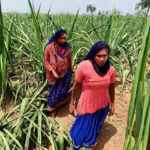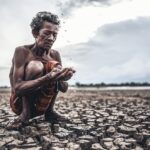Women, Children Bear Climate Change’s Brunt Across India’s Agroecological Zones: Report

Study ‘How does climate change impact women and children across agroecological zones in India’ reveals stark gender disparities and heightened risks, emphasizing urgent need for inclusive climate action
Amid the ongoing climate change crisis, the rise in temperature poses serious health risks to pregnant women, including preterm delivery, gestational hypertension and pre-eclampsia, according to a study by MS Swaminathan Research Foundation, Associated Chambers of Commerce Industry of India (Assocham) and Karmannya.
The study, titled ‘How does climate change impact women and children across agroecological zones in India: a scoping study’, stated that women and children are disproportionately affected by the impacts of climate change, facing heightened risks across various life stages.
In India, approximately 51 per cent of children are impacted by the double threat of poverty and climate crises, with about 352 million children facing at least one climate event annually. UNICEF’s Child-focused Climate Risk Index ranked India 26 out of 163 countries in 2021, highlighting the significant vulnerability of children to climate change consequences.
The impacts on children include food and nutrition insecurity, health issues, disruptions in education and increased risks of vector-borne diseases like malaria and dengue, as per the report.
The report also highlighted that efforts to address climate change must prioritise the inclusion of women and children. Women’s empowerment is crucial for effective climate solutions, as they can significantly increase agricultural yields when provided with equal access to resources.
Additionally, women, particularly from tribal and rural communities, possess valuable knowledge and expertise essential for building resilience and reducing greenhouse gas emissions. “Empowering children and youth is also essential for meaningful participation in developing equitable climate action,” the report added.
Climate change has significant implications for women’s health, particularly during extreme weather events like heatwaves and floods. Pregnant women face heightened risks, including exposure to contaminated water and limited access to healthcare services during disasters.
The report added that heatwaves and air pollution also pose significant health risks to women, with studies linking heatwaves to increased mortality rates and air pollution to respiratory issues.
In terms of livelihoods, women in developing countries, especially rural smallholder farmers, face multiple risks and challenges due to climate change. Agriculture, a primary livelihood for many women, is impacted by temperature extremes and rainfall variability, affecting productivity and incomes.
Additionally, forest-based livelihoods and coastal communities dependent on marine ecosystems are also at risk due to climate change, further exacerbating gender disparities in employment and income.
Efforts to address the gendered impacts of climate change must include targeted interventions to reduce vulnerabilities and empower women and children. Collecting gender-disaggregated data and ensuring gender-sensitive adaptation strategies are crucial steps in building resilience and fostering equitable climate action, the report stated.























































































































































































































































































































































































































































































































































































































































































































































































































































